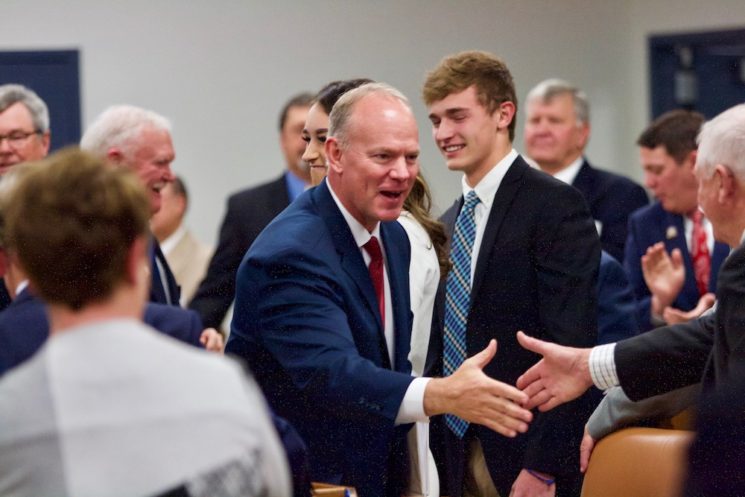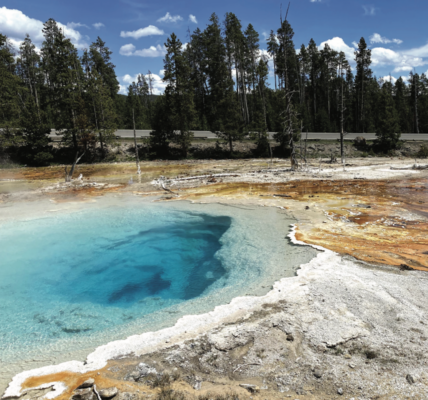By Andrew Graham, WyoFile.com
CHEYENNE — Gov. Matt Mead supports smaller cuts, spending from savings, and diverting investment income to fund public schools, he told WyoFile Monday.
“We have to fund education. It’s part and parcel of just what we care about in this state,” Mead said.
The governor’s stance places him squarely behind the Wyoming House and its plan for meeting Wyoming’s public education and government operations funding shortfalls.
The position diverges sharply from the state Senate’s plan to meet the fiscal issues with deep cuts in spending and the use of savings.
The House has advanced education cuts of about $30 million over the next biennium, paired with a reshuffling of revenue distributions to give school funding a more sustainable footing in years to come.
The Senate has advanced around $76 million in cuts through its budget bill. Many senators, including Senate President Eli Bebout (R-Riverton), oppose the House’s reshuffling of revenue distribution.

“I would probably be more in tune with the lower amount” of cuts, Mead told WyoFile.
Mead referred to his ENDOW initiative, which includes economic development initiatives both chambers continue to advance. “For ENDOW to work we have to have [a well-funded] education system,” Mead said.
When it comes to changing revenue distribution to support education going forward, “I’m more closely aligned with the House side,” Mead said.
In his State of the State address on the Legislature’s opening day, Mead asked lawmakers not to shy away from considering new revenue sources including tax increases, citing specifically a lodging tax pushed by Bebout and a tobacco tax. The House did not consider introducing either of those bills, leaving them dead on arrival.
With new revenues off the table, Mead said Speaker of the House Steve Harshman (R-Casper) is on the right track by re-examining how existing revenue is distributed.
“We ought to be looking at that and I think that’s a fair thing to look at,” he said.
Leading senators have said they prefer to spend from the state’s “rainy day” savings account instead of relying more heavily on investment earnings. Such earnings may never materialize, Bebout and other senators have argued.
“The way they present it is, ‘just take it out of the rainy day fund,’” Mead said. But the existing system which limits the Legislature to spending only cash on hand was never set in stone, he said. The system was designed in a different time for the state, he said, an attitude that has been echoed in Harshman’s call to “modernize” revenue streams.
“It’s all by design,” Mead said. “We set up the accounts and we set up the rules on the accounts.”
The same is true for the state management of its investment earnings, Mead said. “What the speaker is doing is looking at how do you maximize the wealth that you have to meet the needs that you immediately have.”
Before the session began, the Joint Appropriations Committee wrote a budget that paid for education without incorporating any cuts. That gives the Legislature time to try reorganizing revenue streams, Mead said, in order to avoid future fiscal cliffs.
“We do need a sustainable, long-term plan to fund education,” the governor said. “But we have some time to do it. We don’t have to fix it all [now] but I think if we had some of those fixes now to look at more revenue to education that would be a positive outcome.”
House, Senate debate in full force
Debate over whether to change the state’s revenue structure raged on Monday between education committees in both chambers and a newly formed conference committee to negotiate the differences between the House and Senate on their budget bills. One prominent senator called the House’s revenue diversions poorly thought out. Another expressed admiration for the House’s thought process, if not the method.
On Friday, the House Education Committee killed the Senate’s education bill, Senate File 117. Before amendments on the Senate floor, the bill would have cut $114 million from education over the next three years, according to the LSO. Public school advocates said that its changes to health insurance and pensions for school employees brought the total to about $150 million, according to a report in the Casper Star-Tribune.
While the bill is dead, the cuts mandated in SF-117 were amended into the Senate budget bill, where they will be among the points discussed by the budget conference committee.
Monday the Senate Education Committee considered the House’s countermeasure, House Bill 140 School finance amendments – 4, which paired cuts of $30 million with a reshuffling of severance tax diversions and the earmarking of half the state’s online sales taxes and business filing fees for education. Through those measures, and a change to how the state uses investment earnings from its $7 billion trust, the Permanent Mineral Trust Fund, Harshman and other House lawmakers had come up with $241 million in revenues that would flow into school coffers over the next four years.
The rainy day fund, also known as the Legislative Reserve Account, and other savings accounts have enabled the Legislature to avoid even deeper cuts in the last few years. But unless they’re able to access other funding sources, the Legislature will spend more than $1 billion of the $1.8 billion rainy day fund in the next four years. The Senate plan would reduce the drain on savings by imposing its deep spending cuts.
“I’m just trying to set up mechanisms to get us a little cash,” Harshman told the Senate Education Committee. He also said allotting revenue more permanently towards education would protect funding for one of the Legislature’s top priorities, as opposed to hashing out the use of general funds or “rainy day” dollars in each of the coming sessions.
“The general fund is a place where 90 people all have a pretty good idea how to spend money,” Harshman said.
The Senate committee advanced HB-140, but first stripped all reshuffling of revenue. Putting all those changes in a bill on education could run afoul of Wyoming’s Constitution and its rules on a bill’s content aligning with its title, said both Senate Education Committee Chairman Hank Coe (R-Cody) and Sen. Affie Ellis (R-Cheyenne). Coe cited a memo produced by an LSO attorney that raised those concerns and said the bill may be unconstitutional.
To illustrate her point, Ellis put four different books — each representing a different section of Wyoming statute — on her desk. The House’s bill affected all four of them, she said.
The House Rules Committee had considered the constitutionality of putting those measures in the bill and agreed to do it, Harshman said. The body determines what goes in legislation, he said, “not a junior attorney in their second year at LSO.”
He continued. “Did we push that title? You bet, but that’s what we do here,” Harshman said. “We push things and try to solve problems.”
The committee voted in favor of the amendment stripping the revenue diversions, with only Sen. Stephen Pappas (R-Cheyenne) against it. But the chairman said he appreciated the House’s effort to find funding.
“I do admire — significantly — the hard work,” Coe said.hile the measures to redraw the state’s revenue pie were removed from HB-140, similar changes exist in the House’s version of the budget bill. The Senate removed all such diversions from its budget bill. A few hours later, the members of the conference committee negotiating the differences between the House and Senate budget bills found themselves at odds over the changes.
House Appropriations Chairman Bob Nicholas (R-Cheyenne) sits on the conference committee. He is frustrated that Joint Appropriations Committee work conducted to balance the budget before the session has been undone, he said.
“They’re weighing down everything that this committee did,” he said of the senators. “We’re having to rehash all these battles.”
But Senate Appropriations Committee Chairman Bruce Burns said House and Senate JAC members weren’t as aligned as Nicholas thought.
“The speaker has been hauling people into his office for his multimedia show like a timeshare salesman for weeks now,” Burns said.
He was referring to Harshman’s efforts to explain to lawmakers the changes to revenue streams that he’s proposed. Harshman uses a television in his office to show projections of complex charts illustrating how revenue is divvied up and how that might change.
“He seems to have you all convinced,” Burns said to the House members on the conference committee, but senators are not. “We think it’s needlessly opaque,” he said. “We’re also not a fan of the earmarking.”
Mead backs Harshman on earmarking
The earmarking debate came up before the Senate Education Committee as well.
“Isn’t that earmarking?” Coe asked Harshman as the Speaker explained some of the revenue rearranging.
“Oh absolutely, oh yeah,” Harshman said. He pushed back on the idea that earmarking is something the Wyoming Legislature stands against. “There’s spiderwebs of earmarks on every account we’ve got,” he said.
Mead agreed with that assessment. “I think it’s a bit of a myth that we don’t earmark now,” he said. “There’s a lot of things that are earmarked.”
Wyoming’s Legislature meets every year, and statutes can always be unwritten, Mead said. “These things are not set in stone,” Mead said. “We move these accounts around. We set up what are the flows into different accounts. Those can be done and undone.”
For the last eight years, Mead has presided over the agencies whose budgets shrink and grow at the direction of the Legislature. At times, he has had to make tough decisions. When mineral revenue sharply dropped off in 2016, he imposed about $250 million in cuts. Some lawmakers may not like earmarks, he said, but they bring a level of stability to agency budgets.
“It allows, I think, an opportunity for good budgeting — for not only the executive branch but also the legislative branch,” he said.




